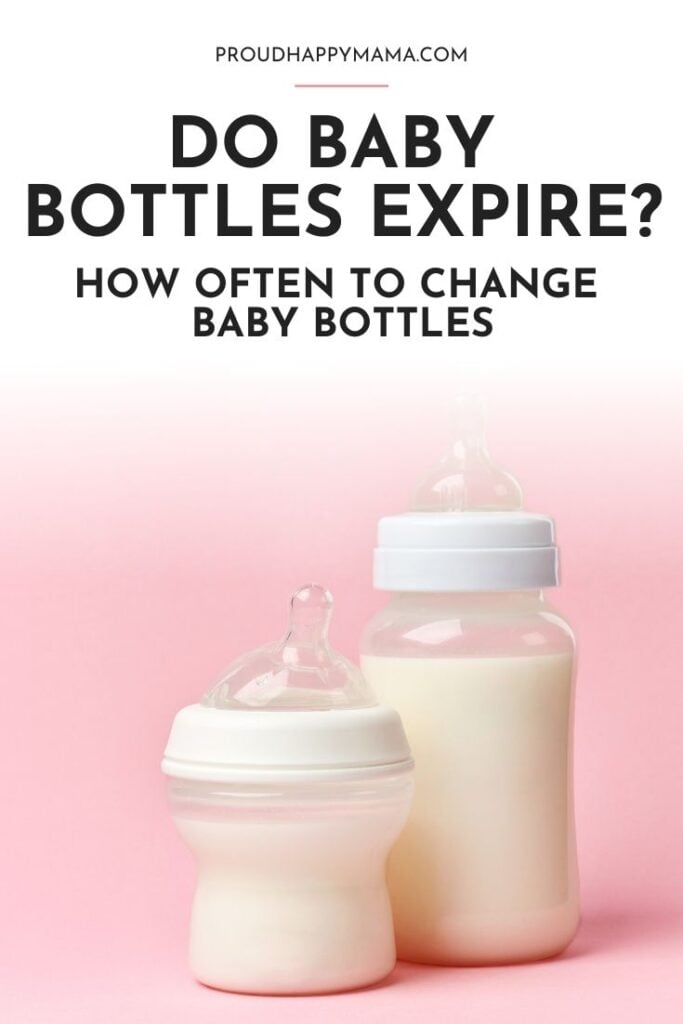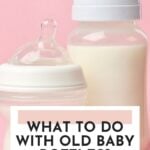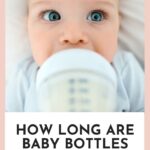Do Baby Bottles Expire?
Questioning do baby bottles expire?
In this old baby bottle guide we talk all about how long can you use baby bottles, how to care for and how to store baby bottles, the key signs of an old baby bottle, and what to do with old baby bottles!
Let’s face it, if you are bottle feeding your baby you are probably going to have several baby bottles around your home.
You’ll want to have spares, so you don’t have to wash them right away, for your diaper bag, or even your child’s daycare.
But, that leaves you wondering – how long are baby bottles good for?
That’s why we created this guide! So, you can learn everything you need to know about how often to change baby bottles.
And while we are talking about old baby bottles, you might want to check out our guides on does baby formula expire, do baby wipes expire, does baby powder expire and do pacifiers expire? Or even our guide on Spectra S1 vs S2.
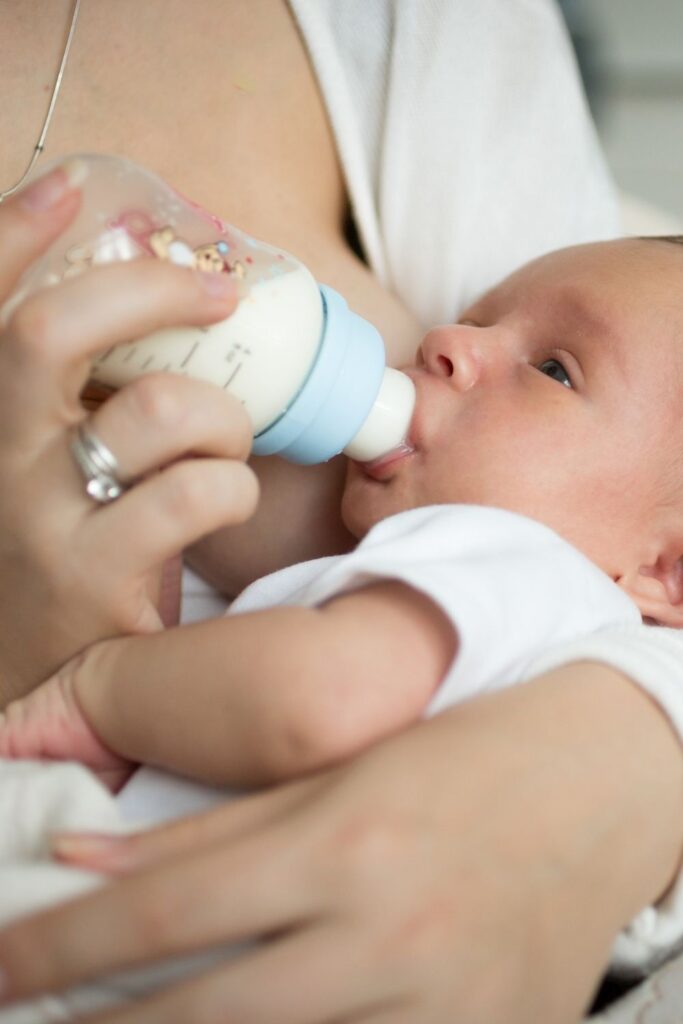
Do Baby Bottles Expire?
No baby bottles do not expire.
You will not find an expiration date on the package of your baby’s bottles. This is because unlike with pacifiers, bottles take less of an impact from your baby sucking due to the hole in the center.
This is not to say that your baby’s bottles will last forever.
In fact, baby bottles do go bad and need to be replaced rather often.
How Do Baby Bottles Go Bad?
There are two main components to look at when checking if your baby bottles have gone bad. The bottle and the bottle nipple.
Plastic Bottle
Plastic bottles do eventually break down.
This can be from sterilizing and going through your dishwasher. If you notice that the plastic has become cloudy and is no longer easy to get clean you should replace your plastic baby bottles.
This is because micro-scratches have formed in the plastic from cleaning. These micro scratches leave room for bacteria to hold on even when cleaning your baby’s bottles.
Washing and sterilizing heats the plastic of your bottles up to high temperatures. This can lead to warming that can sometimes affect the seal of the lid. Warped baby bottles leave room for milk to dribble out and make a mess around your home but can also make it easy for extra air to get into your baby’s bottle causing gas.
Glass Bottle
Glass baby bottles these can last longer without issues due to the glass being harder to break down and harbor bacteria.
However, they can still become damaged and need replacement.
To check, hold your glass bottles up to the light each time you fill them to check for scratches, chips, or cracks.
If any damage is noted, toss the bottle into your recycling bin and replace it with a fresh one.
Bottle Nipple
The bottle nipples that belong to your baby’s bottle go bad a lot easier than the base of the bottle. This is because they are made of softer material that tugs and pulls as your baby sucks. This soft material also tends to fall prey to tiny sharp baby teeth that cut through them faster than ever.
When your baby bottle nipple goes bad it becomes a choking hazard.
Baby bottle nipples are most often damaged from the nipple brush being pushed through the hold making it too big for your baby. If this happens your baby is likely to choke or fuss when the milk comes out too fast for them.
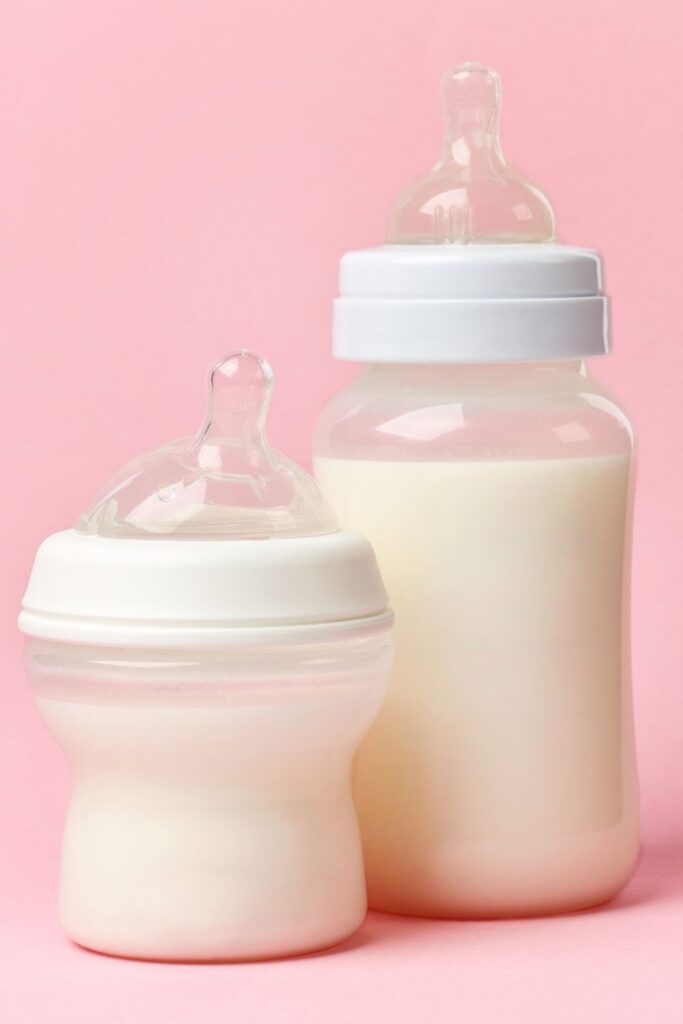
How To Check Your Bottle Nipple
When your baby bottle nipple wears down it becomes a choking hazard you need to check the nipple with each feeding just like you do with a pacifier.
While your baby is likely to fuss when the nipple of the bottle is damaged giving you a heads up this is never a guarantee and checking manually is worth the effort.
Simply pull the nipple up from the base, point at a light, and look for cracks or holes.
Pinch the top of the nipple to see if the hole in the bottle has ripped open wider.
If you notice signs of damage to the nipple, toss it out and replace it with a new one.
How Often Should You Replace Your Bottles?
How often to replace baby bottles?
Well, if you notice cloudiness, cracks, warping, or color changes you should replace your bottles imminently to prevent problems like the growth of bacteria or leaks.
Bottles, in general, should be replaced every 4 to 6 months. When it is time to replace your baby’s bottles it is time to assess if your baby is ready to move up a nipple size.
The nipples of your baby bottles should be replaced every 1 to 2 months even if they do not show signs of damage. This helps to prevent unnoticed wear and tear from turning into a choking hazard.
When it comes to your baby’s safety you should always air on the side of caution.
You might also like this guide on how many baby bottles do I need?
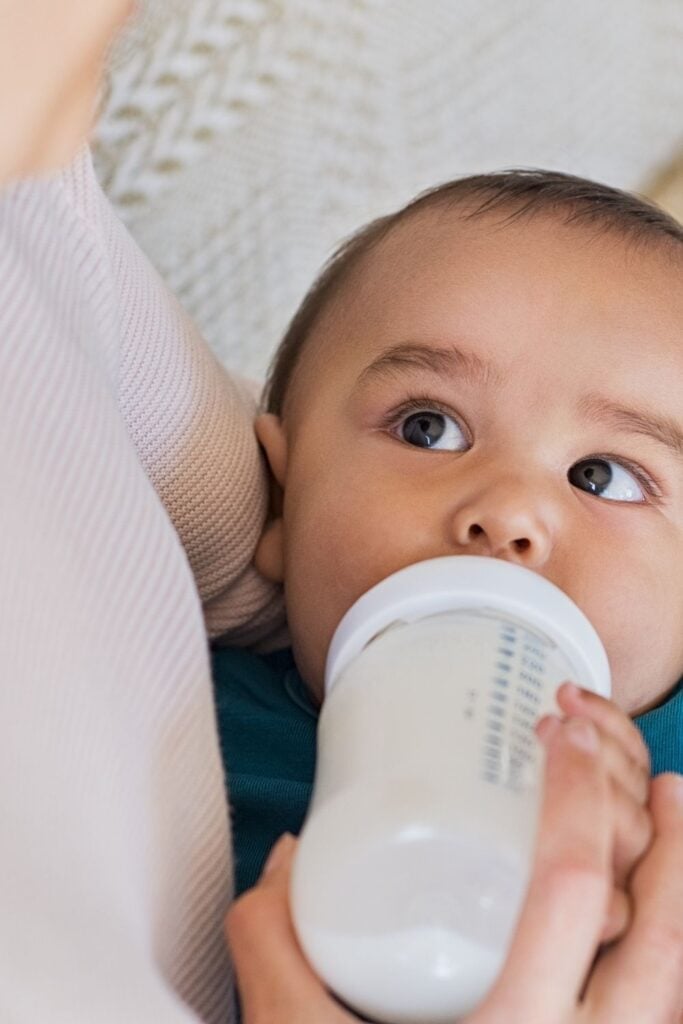
How To Care For Your Baby Bottles
To make your baby bottles last and prevent risks to your baby you should take good care of them. Your baby’s bottles should be washed or at least rinsed out after use and not left to sit filled with milk or formula. Leaving them to sit encourages the growth of bacteria and mold that can be hard to completely remove.
When you are ready to give your bottles a full wash, always soak them in hot water to listen up any stuck-on fat and proteins that can lead to bacterial growth. Hand washing with a bottle brush will get a cleaner finish than your dishwasher. If you chose to wash your bottles in the dishwasher, use the top rack to avoid melting and warping of your bottles.
For young babies, it is important to sterilize bottles to protect your baby from getting sick due to any bacteria in your bottles. You should sterilize them after washing before use. This can be done in your dishwasher on the fertilizing setting, by boiling on the stove or using a steam sterilizer.
The high heat of sterilizing does shorten the lifespan of plastics, but it helps to protect your baby from illness making the trade-off of needing to replace bottles every 4 to 6 months well worth it.
Allow bottles and nipples to air dry rather than hand drying them. This will prevent bacteria that have settled onto your dish towels from getting into your bottles. Air drying may take a bit longer before you put your bottles away, but a drying rack can be a big help in allowing air to circulate.
Never freeze milk directly in your bottles unless they are designed for frozen milk storage. Some types of plastic cannot handle the expanding and contracting of freezing and will warp or even crack if you use them in the freezer. If you want a feeding system that allows you to use the same bottles for feeding and storage, choose a bottle that is specially designed for a feeding system that attaches bottles to your milk bags.
Remember that like with pacifiers and other baby items that tend to wear out, frequent replacement is the best choice even if the item may look like it has a bit of life left in it.
Final Thoughts On How Long Do Baby Bottles Last
Whilst baby bottles don’t expire, they also won’t last forever and should need to replaced regularly.
We hope this guide has been helpful in answering your questions on how long are baby bottles good for and when to replace baby bottles.
And if you’re looking for more great guides, then check out these guides on best bottles for breastfed babies, how to warm bottles on the go, best bottles for tongue tie, and best baby bottles for reflux.
